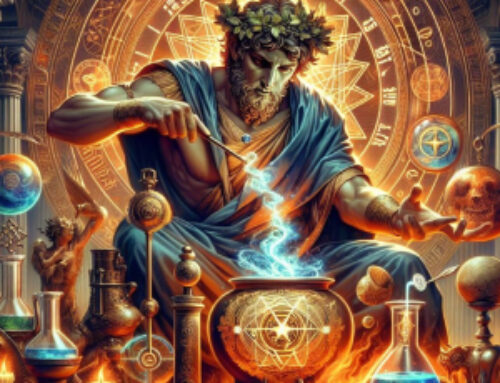Contents
- 1 History of Hermeticism
- 2 The Roots of Hermeticism: A Mystical Beginning
- 3 Hermes Trismegistus: The Thrice-Great Teacher
- 4 The Golden Age of Hermetic Tradition in Ancient Greece and Egypt
- 5 The Hermetic Philosophy
- 6 This makes Hermeticism relevant in modern times.
- 7 Practical Hermeticism: Spirituality and Life Change.
- 8 The Hermetic Academy: A Modern Guide
- 9 Conclusion: Hermeticism’s Timeless Wisdom and Its Contribution to Modern Spirituality Hermeticism
History of Hermeticism
Hermeticism is an ancient knowledge system that explores the mysteries of the universe, the power of the mind, and the depths of spirituality. In this blog post, we delve into the history of Hermeticism, discovering its origins, development, and how it inspires people around the world to strive for positive changes in their lives and environment.
The Roots of Hermeticism: A Mystical Beginning
Hermeticism is an esoteric tradition that combines elements of Greek philosophy, Egyptian wisdom, and alchemical practices. The term ‘Hermeticism’ derives from Hermes Trismegistus, a mythical sage whose name means ‘thrice great’ and who is considered a mediator between the divine and humans. He symbolizes the union and mastery of wisdom, magic, and alchemy.
The origins of Hermeticism date back to ancient times, when Hermes Trismegistus was venerated as a combination of the Greek deity Hermes, the divine messenger, and the Egyptian deity Thoth, the god of wisdom and writing. This fusion of cultural influences is evident in the Hermetic texts, which encompass various subjects ranging from philosophy and natural sciences to spiritual practices. These texts, including the ‘Corpus Hermeticum,’ are considered the foundation of the Hermetic tradition. They have inspired seekers on their spiritual path for centuries.
Hermeticism emphasizes the quest for knowledge and enlightenment, the transformation of the self, and the exploration of the cosmos. The figure of Hermes Trismegistus represents not only the origins of this spiritual tradition but also humanity’s pursuit of universal wisdom and connection with the divine.

Hermes Trismegistus: The Thrice-Great Teacher
Hermes Trismegistus is a revered figure in Hermeticism, considered a synthesis of the Greek god Hermes and the Egyptian god Thoth. He is known for his wisdom, magical abilities, and masterful alchemy. The Corpus Hermeticum, a collection of writings attributed to Hermes Trismegistus, is the central work of the Hermetic tradition. These texts discuss the nature of the divine, cosmology, spiritual enlightenment, and the alchemy of the mind.
The connection to Thoth, the Egyptian god of wisdom, writing, and knowledge, underscores the significance of Hermes Trismegistus as a bridge between heaven and earth, between the divine and humans. Thoth was revered as the keeper of secret knowledge and the creator of writing, similar to Hermes Trismegistus. Hermes Trismegistus embodies not only the legacy of Egyptian wisdom but also the universal quest for knowledge and self-realization in harmony with the cosmos.
The Golden Age of Hermetic Tradition in Ancient Greece and Egypt
The Hermetic tradition flourished during ancient Greece and Egypt, where Greek and Egyptian influences blended to create a rich cultural and spiritual synthesis. This fusion of philosophies, religious beliefs, and mystical practices provided fertile ground for the emergence and development of Hermeticism, particularly in Hellenistic Egypt. The Greek culture contributed its philosophical traditions and the concept of the Logos, while the Egyptian heritage brought its mystical and magical traditions associated with the god Thoth into this amalgamation.
The Hermetic texts, particularly the ‘Corpus Hermeticum,’ played a central role in the ancient world as a bridge between these two cultures. The Hermetic tradition offered a comprehensive system of teachings that included cosmological concepts, philosophical speculations, and guidelines for spiritual practice. The aim of these writings was to deepen humans’ understanding of the universe and their own divine nature, providing paths to spiritual enlightenment and transformation.
The Hermetic tradition had a significant impact on the spiritual landscape of ancient Greece and Egypt, as well as later esoteric and mystical movements worldwide. Its teachings on the unity of the cosmos, the power of the mind, and the possibility of individual spiritual transformation have remained significant over the centuries and continue to inspire seekers on their spiritual path today.
Hermeticism in the Middle Ages: Persecution and Rediscovery.
During the Middle Ages, Hermeticism experienced a time of ambivalence. Although hermetic knowledge was often persecuted under the pressure of the orthodox Church in Europe, its writings were preserved and rediscovered, thanks in part to the crucial role played by Arabic scholars in transmitting Hermetic texts. During the Golden Age of Islam, scholars translated, studied, and expanded upon these writings, thus preserving and further developing knowledge.
The Renaissance marked the beginning of a new era of Hermeticism in Europe, as the growing interest in ancient knowledge and the rediscovery of Greek and Egyptian sources brought the Hermetic texts, particularly the ‘Corpus Hermeticum,’ back into the focus of European scholars. During the Renaissance period, there was a heightened interest in Hermetic thought, which became a topic of discussion in scientific, philosophical, and artistic circles. Scholars of the time believed that Hermeticism held profound wisdom that could lead to the revitalization of intellectual and spiritual life in Europe.
The Hermetic Philosophy
The Hermetic Philosophy is a profound spiritual tradition rooted in the teachings of Hermes Trismegistus. It encompasses a broad spectrum of knowledge and practices aimed at self-transformation and understanding cosmic laws. Its significance extends beyond mere knowledge collection and concerns how we understand the world and our place in it. According to this philosophy, everything in the universe is interconnected, and our thoughts and actions influence the cosmic balance.
Hermetic philosophy incorporates alchemy, astrology, and theurgy. Alchemy represents the spiritual transformation of humans, symbolized by the transformation of base metals into gold. It involves an inner purification process and enlightenment achieved through self-reflection and knowledge on an initiatory path. Astrology teaches us about the deep connections between cosmic movements and human destiny, revealing the harmony of the universe and guiding us on how-to live-in accordance with these forces. Theurgy is the practice of magical rituals aimed at establishing a direct connection to the divine to gain divine wisdom and guidance.
Together, these disciplines form a holistic system aimed at expanding consciousness, refining the soul, and gaining a deeper understanding of life and its mystical dimensions. Hermetic philosophy offers a guide for personal and spiritual development, relevant to modern humans’ search for meaning and connection.
This makes Hermeticism relevant in modern times.
In modern times, Hermeticism had a significant impact on the Enlightenment and the development of the sciences by promoting the pursuit of knowledge and the critical questioning of traditional beliefs. Hermetic ideas inspired thinkers to explore natural laws and develop a new understanding of the world and the cosmos. This period was marked by an increasing fascination with alchemy, astrology, and mystical traditions, which acted as precursors to scientific discoveries in fields such as chemistry and astronomy.
Hermetic thinking has a broad application and influence in modern esotericism, affecting various spiritual movements and practices, from the New Thought movement to contemporary occultism. Hermetic principles, such as the law of attraction, the idea of mentally creating reality, and the emphasis on the unity of all life, are present in a variety of modern spiritual and self-help approaches. Therefore, Hermeticism offers timeless wisdom that inspires people today to seek deeper spiritual understanding and personal transformation beyond material existence.
Practical Hermeticism: Spirituality and Life Change.
The practical application of Hermetic principles in daily life offers a powerful path to personal growth and transformation. By living the principle ‘All is Mind,’ one can consciously shape their reality by focusing on positive thoughts and intentions. This fosters a deeper understanding of one’s creative power and responsibility for their life.
The Principle of Correspondence, ‘As above, so below; as within, so without,’ teaches that external circumstances often mirror internal states. Therefore, working on oneself and promoting inner peace and harmony can also bring about positive changes in one’s environment.
Another example is the application of the Principle of Rhythm, which acknowledges the natural cycles of life. By learning to flow with these cycles instead of resisting them, individuals can develop resilience to life’s challenges and face times of change with greater serenity.
The practical application of Hermetic principles can provide a deeper awareness of life’s hidden connections and lead to spiritual development and self-realization.
The Hermetic Academy: A Modern Guide
The Hermetic Academy is a guide for disseminating Hermetic knowledge and deepening spiritual practice in the modern world. It offers a structured environment where interested individuals are systematically introduced to the principles and techniques of Hermeticism through courses, lectures, and workshops led by experienced teachers. The Academy aims to enable deep immersion in the subject matter and foster a comprehensive understanding of Hermetic teachings.
The Hermetic Academy plays a crucial role in providing resources for individuals who are searching for meaning, depth, and spiritual orientation. The Academy offers access to millennia-old knowledge through modern teaching methods. Its unique quality lies in the Initiatory Path, which gradually leads individuals to the highest enlightenment and their evolutionary goal.
The courses teach participants how to apply Hermetic principles in their personal and professional lives to promote growth, healing, and transformation. Advanced studies and the opportunity to become part of a vibrant community of like-minded individuals are also offered by the Academy for those who wish to delve deeper into the subject matter. This exchange and collective practice promote personal development and understanding of Hermetic wisdom. The Hermetic Academy serves as a contemporary guide to spiritual enlightenment and personal mastery.
Conclusion: Hermeticism’s Timeless Wisdom and Its Contribution to Modern Spirituality Hermeticism
is a treasure trove of timeless wisdom that remains a cornerstone of modern spirituality. Its principles and teachings offer profound insights into the nature of reality and the path to personal transformation. In a time marked by material pursuits and external noise, Hermeticism calls for reflection on the inner voice and recognition of one’s divine nature. Hermeticism teaches that understanding and applying its universal laws can lead to a fulfilled life in harmony with the cosmos. Therefore, it significantly contributes to building bridges between ancient knowledge and contemporary search for meaning, enlightenment, and spiritual growth.
By exploring the paths of the past, we can open up ways to a more conscious future. The Hermetic Academy is ready to accompany you on your journey through the mysteries of Hermeticism. Discover courses that provide practical guidance for spiritual practice and impart knowledge. Visit their website for personal and spiritual development.
The history of Hermeticism teaches us to look beyond the material world and recognize the deep connections between all that exists. Its wisdom holds the key to personal transformation and a more fulfilled life. Embark on this ancient path with an open heart and an inquiring mind.





